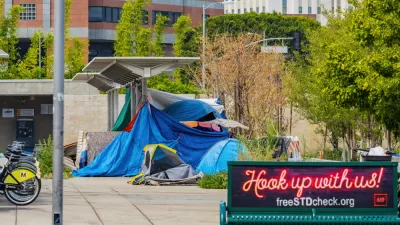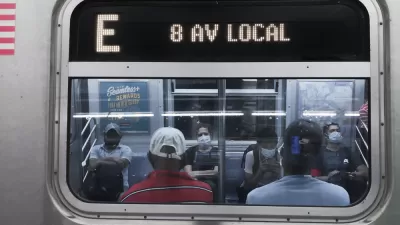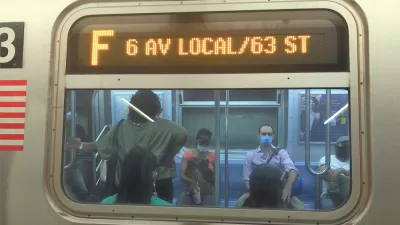Since the outset of the pandemic, the capital of car-oriented sprawl in California has become the king of public transit. Looking for lessons about the future of public transit in the United States? Look to San Francisco and Los Angeles.

By reputation and ridership, the San Francisco Bay Area has long been considered the much more transit-oriented urban region in California when compared to Los Angeles. But pandemic trends have changed that balance of power, according to a paywalled article by Eliyahu Kamisher for the Mercury News.
“[O]ver the past two and a half years, the Bay Area’s claim to California’s mass transit throne has been deeply eroded, if not undone,” writes Kamisher. “L.A. now has more people riding buses, light rails and trains than the Bay Area. And even when accounting for the Bay Area’s far smaller population, L.A.’s per-capita transit ridership temporarily surpassed its Northern California neighbor for the first time in at least two decades.”
Specifically, “In 2019, transit riders in six Bay Area counties took 43 million more trips than L.A. County, which is over a third larger by population. But in 2021, Los Angeles racked up over 83 million more transit trips than the Bay Area.” That “staggering” threefold reversal is a living text case for the future of transit, post-pandemic, according to Kamisher.
The article blames the Bay Area’s reduced ridership on the large populations of regional workers in white color jobs staying home instead of commuting to the office (a familiar narrative with profound implications for the future of San Francisco, which has been slower than all other U.S. cities to recover to pre-pandemic office occupancies and other metrics of traditional urban core activity).
In Los Angeles, by comparison, buses are packed with riders who never stopped using the system. “L.A.’s three largest bus operators, dominated by L.A. Metro, have a ridership recovery of 74%, which is among the highest rates in the country, outpacing New York City buses and peer bus agencies in the Bay Area. L.A. Metro’s latest budget is predicting a full return to pre-pandemic bus boardings by spring of 2023,” according to Kamisher.
The trends in both regions are upending long-held beliefs about the way cities work. Los Angeles is known, for example, as a capital of car-oriented sprawl. Bus riders are now revealing a different side of the city.
FULL STORY: The Bay Area was California’s transit mecca. Now car-crazy L.A. has more train and bus riders.

Alabama: Trump Terminates Settlements for Black Communities Harmed By Raw Sewage
Trump deemed the landmark civil rights agreement “illegal DEI and environmental justice policy.”

Study: Maui’s Plan to Convert Vacation Rentals to Long-Term Housing Could Cause Nearly $1 Billion Economic Loss
The plan would reduce visitor accommodation by 25% resulting in 1,900 jobs lost.

Planetizen Federal Action Tracker
A weekly monitor of how Trump’s orders and actions are impacting planners and planning in America.

Wind Energy on the Rise Despite Federal Policy Reversal
The Trump administration is revoking federal support for renewable energy, but demand for new projects continues unabated.

Passengers Flock to Caltrain After Electrification
The new electric trains are running faster and more reliably, leading to strong ridership growth on the Bay Area rail system.

Texas Churches Rally Behind ‘Yes in God’s Back Yard’ Legislation
Religious leaders want the state to reduce zoning regulations to streamline leasing church-owned land to housing developers.
Urban Design for Planners 1: Software Tools
This six-course series explores essential urban design concepts using open source software and equips planners with the tools they need to participate fully in the urban design process.
Planning for Universal Design
Learn the tools for implementing Universal Design in planning regulations.
Caltrans
Smith Gee Studio
Institute for Housing and Urban Development Studies (IHS)
City of Grandview
Harvard GSD Executive Education
Toledo-Lucas County Plan Commissions
Salt Lake City
NYU Wagner Graduate School of Public Service





























